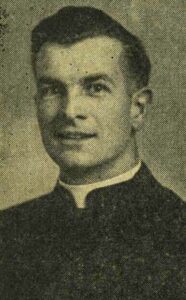Father Epoch, Brother Hinton, Brother O’Meare assaults settled individually with 29 victims
EDITOR’S WARNING: The following story contains details regarding historic sexual abuse. Support can be found at the following sources: National Residential School Crisis Line: 1-866-925-4419; 24-hour crisis line: 1-416-597-8808; Canadian Human Trafficking Hotline: 1-833-900-1010 and/or Trans Lifeline: 1-877-330-6366.
WIIKWEMKOONG—A $100 million sexual assault class action suit, involving 29 alleged victims of the late Fr. George Epoch, Brother Norman Hinton and Brother O’Meare has been decertified following a settlement reached between the two representative alleged victims. The original claim was for $100 million however the total amount involved in the settlement is sealed and not publicly available.
Launched in 2015 with several defendants, including the Roman Catholic Episcopal Corporation of the Diocese of Sault Ste. Marie, the Roman Catholic Bishop of Sault Ste. Marie, the Estate of Father George Epoch and the Estate of Brother O’Meare, the suit sought redress for sexual abuse suffered while the defendants served at Holy Cross Church in Wiikwemkoong.
According to court documents, the action was brought “on behalf of all persons who were abused as children by clergy or staff of the Holy Cross Mission in Wiikwemkoong (and) all parents, spouses, children and siblings of the abused persons.”
Br. O’Meare was alleged to have committed the sex abuse between 1950 and 1960, while Fr. Epoch’s alleged crimes took place when he worked there from 1959 to 1963, 1969 to 1971 and 1983 to 1986, the suit alleges. A third clergy member, Brother Hinton, was also named as someone who abused children, between 1963 until 1970, but his whereabouts or even if he remains alive is not known.

Wiikwemkoong elder Josh Eshkawkogan was one of the plaintiffs who settled outside of the court process and whose story was chronicled by Expositor staffer Warren Schlote in 2019 noted that the settlement helped his closure by providing a concrete acknowledgment of what he had gone through.
“It’s always about closure of what we encountered in the past,” he said. “If we have to go through the process, courts and whatnot, so be it.” He added that the acknowledgment has helped him in his journey to “release that trauma.”
Mr. Eshkawkogan said that he has spent a lifetime working through his personal trauma, finding a way to forgive himself and understand that nothing that happened was his fault, but also to find a path to forgiveness for his abuser. “It was a journey that has taken me to my current lifestyle,” he said, noting that his current path is much healthier than it sometimes was in the past.
“There are probably a lot of people in the community who are still struggling with the hurt and reliving their own trauma,” said Mr. Eshkawkogan. “I hope that, in some way, my sharing of my own story and experience will help them in their journey of healing. I am glad of where I am now in my life.”
“So, It was then I started my healing journey, I went back to my grassroots, of who I was,’ said Mr. Eshkawkogan. “I started my own method of healing ways, to move forward. I went back to my teachings of ceremony, pipe, sweat lodge, circle teachings and other different healing ways. So, I created my healing space at my address, it was connection to the land, my environment, water for balance, so, I offer my space of healing to others I work with at health centres, schools, elders’ residences with the University of Toronto and Kenjgewin Teg. I also started providing individual counselling and identity naming ceremonies. I’m really pleased to say, although it was a long journey, I am thankful to be able to assist others on finding themselves like I did. My special place of residence is open to anyone looking for healing.
According to the court documents, then Wiikwemkoong Chief Duke Peltier and senior policy analyst Sandra Wabegijig approached counsel for the Jesuit Fathers of Upper Canada requesting that the legal process be resolved by “an informal process” in order to not retraumatize the victims.
According to court documents, an agreement was reached that compensation would be negotiated in accordance with the awards made in the Federal Day School Settlement and similar to the Indian Residential Schools Class Action.
All 29 plaintiffs received settlements following those negotiations, although the terms of those settlements has not been disclosed to the court, something presiding judge found problematic, writing in his decision, “It may be that the negotiated settlements and the fees are reasonable and in the best interests of the putative class members who settled, but I cannot conclude that based on the information proffered on this discontinuance motion.”
Despite misgivings, and considering none of the plaintiffs in the case are continuing legal, Justice Perell ruled it would be “futile” to prolong the case.
“There are no representative plaintiffs willing to represent the putative class members who have not settled, and, in any event, the defendants could have the proposed class action mandatorily dismissed for delay,” concluded the judge in delivering the ruling.





